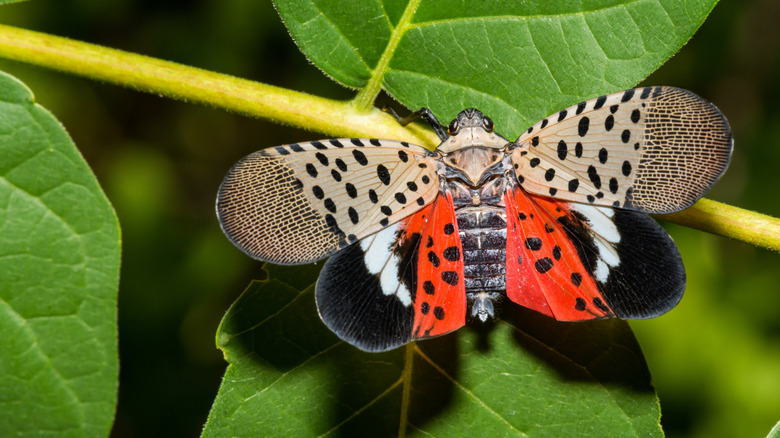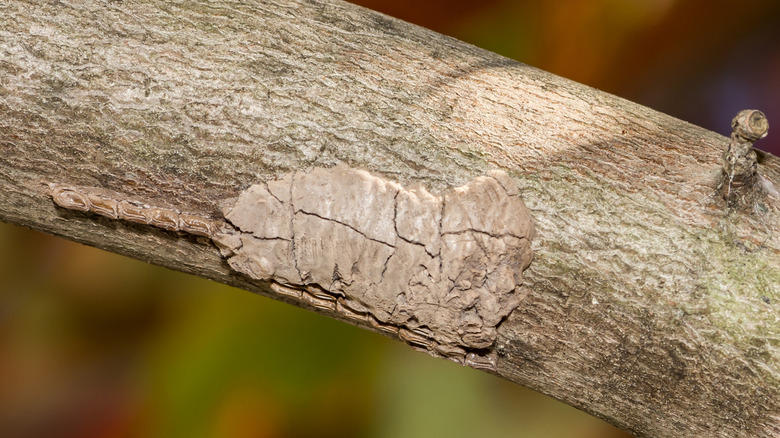The Highly Invasive Insect That NYC Is About To See A Massive Increase In (& What To Do About It)
One of the hard truths of gardening is that pests are inevitable — there's simply no way to eliminate harmful critters from your garden completely (especially if you want beneficial critters to survive). But it's not often that a pest is so pervasive and damaging that whole cities are called to arms against it. Enter the spotted lanternfly, an invasive insect that's resurging in New York City this summer. Residents have been urged to kill spotted lanternflies on sight, but luckily, there haven't been many reports of these insects destroying home gardens.
Spotted lanternflies (Lycorma delicatula) are native to China, India, and Vietnam, and were first spotted in the U.S. in 2014. They are black with white spots as juvenile nymphs, then gain red color as adults. They are not flies, but planthoppers, so they hop from plant to plant like aphids or cicadas. They have been a major source of damage in the fruit and tree industries and are currently found in 18 states, including New York. These bugs were all over the place in NYC in 2023, but 2024 saw a major decline in their population. Now, swarms are being spotted in the city again, as well as the rest of the northeastern U.S.; their eggs may be hatching earlier than usual because of warmer temperatures. Even if you don't have a garden, you'll likely spot some of these insects this year. But if you do have a garden, your plants will be safe as long as you properly maintain them.
What to do about spotted lanternflies in your garden
Spotted lanternflies' main host plant is called tree of heaven (Ailanthus altissima), which is also invasive and incredibly difficult to remove. Even when cut down, it will regenerate, and regenerating trees of heaven may be another culprit behind the boom in spotted lanternfly populations. However, these insects also eat more than 70 other plants, including grapes, apples, peaches, cucumbers, asparagus, basil, roses, and peonies. After feeding on the plants, they excrete a sugary waste called honeydew, which is the real troublemaker: it stinks, attracts other pests, and is hard to clean, and it may lead to mold growth.
Importantly, while invasive spotted lanternflies pose a risk to certain agricultural industries, they're more of a harmless nuisance in home gardening. They don't usually kill plants aside from the tree of heaven, grapevines, and black walnut saplings. They may weaken and stress plants, but not enough to have much of an effect as long as the plants are healthy and mature, and they usually move on before long. The best way to prevent issues from these invaders is to keep your plants healthy with proper watering, mulching, and pruning.
What to do when you see spotted lanternflies
As with pests in general, there's no way to completely prevent spotted lanternflies from visiting your garden. Seeing a few is no cause for concern, though. Experts commonly advise stomping, crushing, or even vacuuming them up. They are typically easiest to see at dusk and nighttime. If you find eggs, smash them and scrape them into a plastic bag full of rubbing alcohol or hand sanitizer; the eggs are grayish-brown and may be laid on any smooth surface.
However, if you see lots of spotted lanternflies swarming on your plants, you'll never be able to kill them all by hand as more will continue to arrive. One option is to create a spotted lanternfly trap, which can capture them as they crawl up tree trunks and help cut the infestation down. One of the best type of trap is called a circle trap, which funnels the insects into a plastic bag. It works best on smooth-barked trees. Avoid sticky traps, as you may end up catching other animals as well, like butterflies or birds. Pesticides are an option as well, but they have limitations and downsides — since they kill beneficial insects as well, they may do more harm than good. A systemic insecticide (one that stays in the plant over time) will kill both current and future spotted lanternflies, and these typically have to be applied by a professional for safety and efficacy. Neem oil and insecticidal soaps, reapplied every few days, can keep nymphs under control but not adults.


